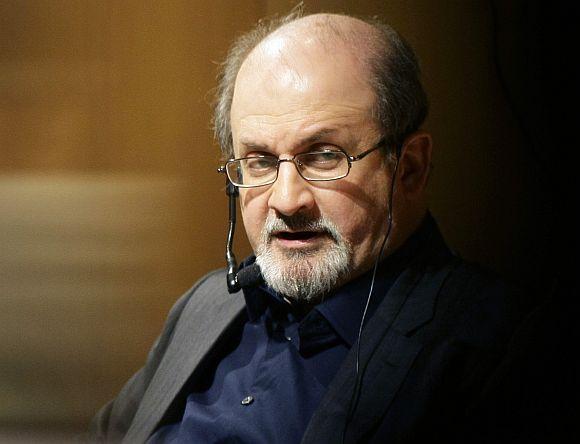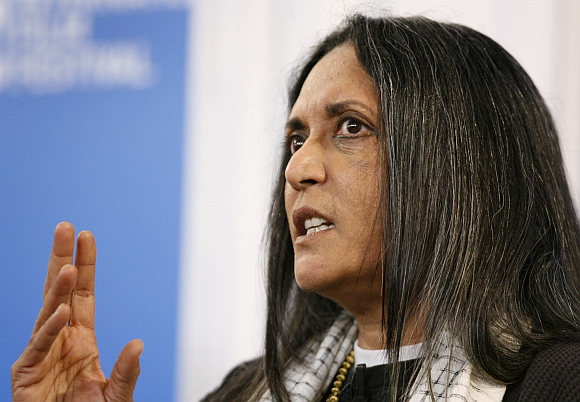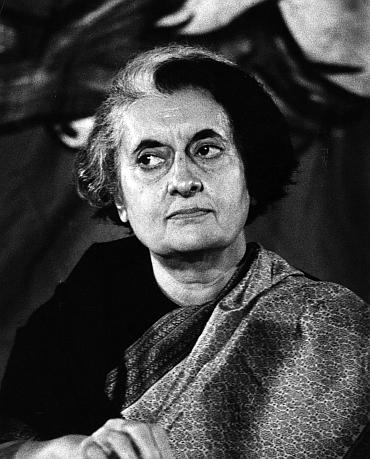In an Exclusive Interview with CNN-IBN's Deputy Editor Sagarika Ghose, one of the greatest contemporary literary voices Salman Rushdie and internationally acclaimed film maker Deepa Mehta talk about the new form of intolerance towards writers, artists and filmmakers in India.
In view of the ban on Kamal Hasan's film 'Viswaroopam' and threats from extremist groups to organisers of Jaipur Literature Festival, author Salman Rushdie tells CNN-IBN that there is a 'cultural emergency' in India.
On cultural terrorism and freedom of writers
Rushdie: It seems that culture has become the new target. It may be because the writers, painters, filmmakers, artists don't have armies. We don't have the manpower to put on streets to defend our films, novels or paintings. So it's not hard to attack.
Unfortunately, the strange form of identity politics has developed in which people don't define themselves with things they love, but by the things they hate. So to attack a book about Ramayan; a book about Shivaji, or a painting about Saraswati -- these things are easy to do.
That somehow galvanises the sense of identity of these extremist forces. Unfortunately, the authorities don't defend the right of people to express themselves, but instead, blame them. For instance, I heard one police officer telling the Jaipur Literature Festival organisers not to do anything to defend someone."
...
On writers facing extremist forces
Image: Director Deepa MehtaPhotographs: Reuters
Rushdie: You don't have to be intimidated, but keep on doing your work.
On freedom of filmmakers
Deepa Mehta: It's been going on with me for about five years now. It started with Fire. At that point when the Shiv Sena attacked theatres, and I thought I won't make another film that has anything to do with India.
But it was childish. It's about a story. It's a story that motivates me as a filmmaker. Then there was Water. It was closed down, I said no again; but you have to carry on. Because, if you have a story that moves you, nobody has the right to ask you not to tell that story because it might offend somebody.
Rushdie: That's about India also. What kind of country would you like to be? A country where Kamal Hasan's films, Deepa's films can be seen, writers from Pakistan can visit and share their ideas, painters as great as Hussain are not forced to exile, the works of great scholars such as Ramanujan are allowed to be studied? In this country, if we believe it to be, all these things should be possible.
On former Prime Minister Indira Gandhi
Image: Former Prime Minister Indira GandhiRushdie: Midnight's Children was written during immediate aftermath of the Emergency. I probably started the book in 1977, which was the last year of Emergency. So the book is written in that atmosphere, so it has a mark of that period. Those who know Emergency understand that she (Indira) owes to the Indian people, should have not damaged the Indian democracy."
Is there anything to celebrate about the Indian republic?
Rushdie: Yes. Like any republic there are certain things to criticise. But when you compare it with the democratic systems in the countries around, possibly with the exception of Bangladesh, you must say that we are not doing so badly. There is always something to celebrate, something to criticise.
On artistic/writers' freedom
Rushdie: It's a different kind of Emergency. I think its counter-emergency. Writers, artists, and filmmakers keep their cool and continue to work. But the society needs to question itself about why is it so easy to shut things down? The nature of democracy is to open up the society as much as one can. But here we see that people find it easy to shut things down.




article